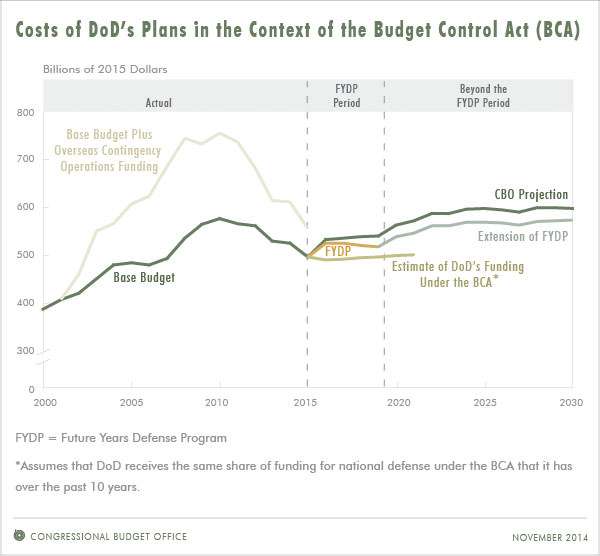Defense Department Plans Bust the Budget and Risk Forced Cuts, Cautions CBO

Defense Department spending plans for the next few years blow through the roof off budget limits imposed by law, warns the Congressional Budget Office (CBO). Specifically, proposals in the five-year Future Years Defense Program (FYDP) provided by Defense officials in April of this year violate spending limitations imposed on the federal government by the Budget Control Act (BCA) forcing (theoretically, since we're talking about government) unplanned cuts at a later date.
In fact, Defense plans are too spendy not just according to CBO estimates of costs based on actual historical experience ("CBO Projection" in the chart below), but also according to the Defense Department's own estimates ("Extension of FYDP") of what stuff costs.

The amount requested for the base budget in 2015 would comply with the limits on budget authority established by the Budget Control Act of 2011 as subsequently modified, hereafter referred to simply as the Budget Control Act (BCA). After 2015, however, the costs of DoD's plans under both projections would significantly exceed CBO's estimate of the funding the department would receive under the BCA, which limits appropriations for national defense through 2021. To remain in compliance with the BCA after 2015, DoD would have to make sharp additional cuts to the size of its forces, curtail the development and purchase of weapons, reduce the extent of its operations and training, or implement some combination of those three actions.
Excessive costs, the CBO estimates, would be about $47 billion a year more than the BCA allows. Even under Defense Department cost estimates, that works out to roughly $31 billion a year more than the law permits. The BCA would then require the sequestration of those excess expenditures, forcing cuts.
Well, that's what the law says. Whether Congress and the president are collectively up to the task of holding the military within budgetary limits is another matter entirely. Which may be exactly why the Department of Defense seems to be making its plans without any thoughts to legal limits on spending.


Show Comments (4)